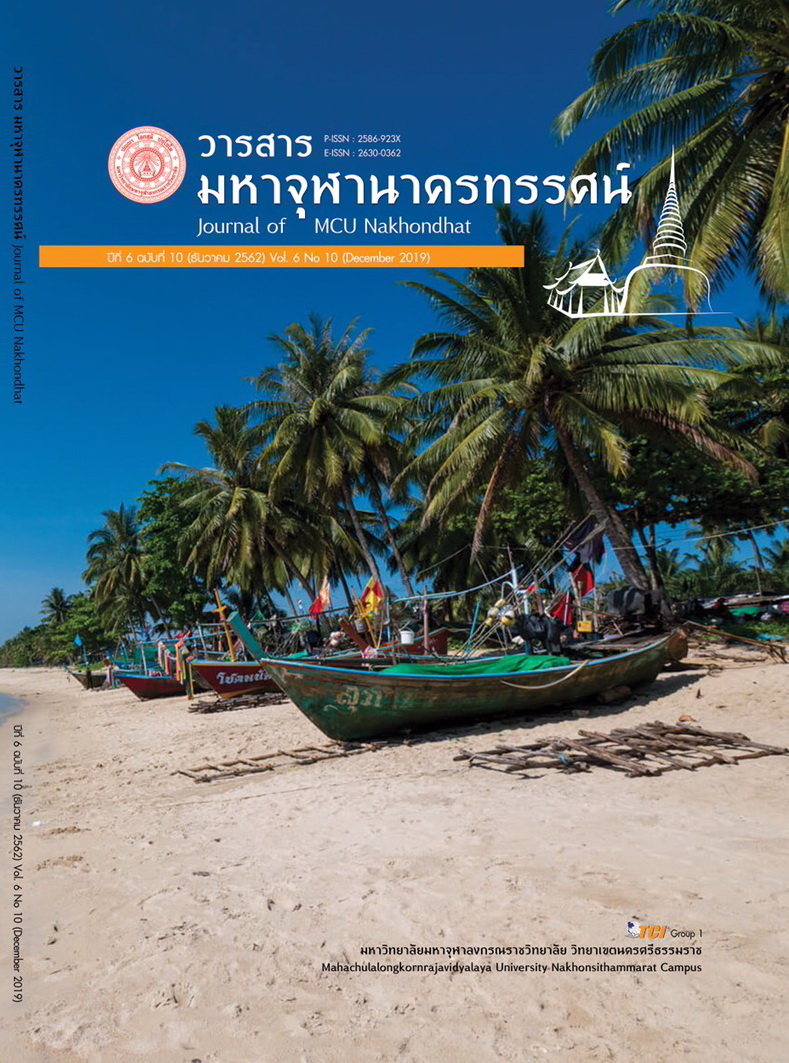THE CONCEPT MIDDLE WAY (MẠCHC̣HIMĀPT̩IPTHĀ) IN RESOLVING CONFLICTS CAUSED BY POLITICAL COMMUNICATION
Main Article Content
Abstract
The objectives of this research are 1) to study the problems of political conflicts arising from political communication, 2) to study the concept middle way in resolving conflicts arising from political communication. By using mixed-method research by mainly using qualitative research and quantitative research supporting In the Sequential Exploratory Design, use a structured in-depth interview There were 5 expert reviewers collecting data from 15 key informants, including politicians, the media and academics. Use the method of data recording in a brief, accurate manner, the meaning of the original text Including important messages as important messages that are to be proven or examined. And synthesized Analyze the descriptive presentation.
The results of the research are as follows:
1) The political conflict in Thailand is the result of the inequality of the social structure which causes the polarization of the political ideology. Unreliable communication Creating fake news to discredit opponents The media are interest groups that have a stake in the news and possess media from politicians or capitalists. Causing the media to be unbiased in presenting true news. 2) Solving conflicts arising from political communication By using the Buddha's teachings on the "Middle Way" consists of 8 elements which are divided into 3 groups which are group 1 "precepts" group 2 "concentration" group 3 "wisdom" these are "middle way" when the 3 groups are adapted for communication politics Will make acting as a mediator between politicians or political organizations and the people are more neutral Causing the conflict to decrease And create social reconciliation.
Article Details
References
ธันยนันท์ จันทร์ทรงพล. (2560). อิทธิพลของสื่อที่มีผลกระทบต่อการเปลี่ยนแปลงทางการเมืองกรณีสถานีโทรทัศน์เคเบิ้ลช่องบลูสกาย. ใน ดษฏีนิพนธ์ปรัชญาดุษฎีบัณฑิต สาขาวิชารัฐศาสตร์. มหาวิทยาลัยรามคำแหง.
ปณัชญา ลีลายุทธ. (2558). การสื่อสารทางการเมืองเพื่อสันติเชิงพุทธบูรณาการ. วารสารบัณฑิตศึกษาปริทรรศน์, 11(3), 39-55.
ประภาพร สีหา. (2560). ความขัดแย้งทางการเมืองกับรัฐประหาร ปี พ.ศ. 2557 . วารสารรัฐศาสตร์ ปริทรรศน์มหาวิทยาลัยเกษตรศาสตร์, 4(2), 145-166.
พระธรรมปิฏก (ป.อ.ปยุตฺโต). (2546). สลายความขัดแย้ง. กรุงเทพมหานคร: สหธรรมิก.
พระปลัดสมบัติ ฐิติญาโณ. (2557). มัชฌิมาปฏิปทา: ทางออกปัญหาความขัดแย้งในสังคมไทย. วารสารสถาบันวิจัยพิมลธรรม, 3(1), 75-89.
พระมหาหรรษา ธมฺมหาโส. (2554). พุทธสันติวิธี. กรุงเทพมหานคร: บริษัท 21 เซนต์จูรี่ จำกัด.
พระมหาหรรษา ธมฺมหาโส. (2555). ปัญจสดมภ์ : ค่านิยมแห่งชาติต่อการสื่อสารทางการเมืองเพื่อสร้างความปรองดอง. กรุงเทพมหานคร: สุขุมวิทการพิมพ์.
ไพรัช พื้นชมภู. (2560). หลักรัฐศาสตร์ที่ปรากฏในพระไตรปิฎก : ประชาธิปไตย. วารสารมหาจุฬาวิชาการ, 4(1), 149-167.
สุภาภรณ์ ติ่งอินทร์. (2553). กลยุทธ์การสื่อสารของสมาชิกวุฒิสภา (ส.ว.) ที่เคยดำรงตำแหน่งกำนัน. กรุงเทพมหานคร: มหาวิทยาลัยธรรมศาสตร์.
อร่ามศรี ศิริพันธ์. (2525). ความขัดแย้งในองค์การ: เครื่องมือของนักบริหาร. วารสารสังคมศาสตร์, 19(2), 51-61.
Lerner D. (1958). The passing of the traditional society. New York: The Free Press.


